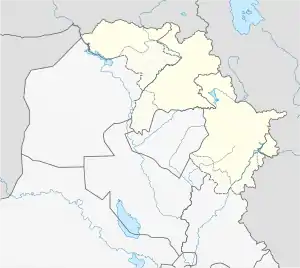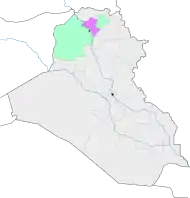Bashiqa
Bashiqa (or Bashika, Kurdish: بەعشیقە ,Başîqa,[1][2] Arabic: بعشيقة, Ba'shiqah Syriac: ܒܥܫܝܩܐ[3]), is a town located in the Al-Hamdaniya District of the Ninawa Governorate in northern Iraq, about 12 kilometres northeast of Mosul.

Population

Bashiqa had an Assyrian and Kurdish population, but is mostly inhabited by Yazidis and Arabs.[4] Bashiqa is surrounded by farms of olives all around the town and there is a small mountain to the north. Bashiqa is famous for its olive trees, Rakı (arak), olive oil, and soap. It is also famous for its onion, pickles. It used to be a tourist destination for the locals in Mosul and Iraqis in general. The Yazidis in Bashiqa and its twin village Bahzani speak Arabic as their mother language.[5]
History
In the mid-1800s, Dr. Asahel Grant visited Bashiqa, which was largely inhabited by Yezidis or "Desani". He took notes on their spiritual practices and beliefs.[6]
Bashiqa is controlled by the Iraqi federal government but claimed by the Kurdistan Region since the fall of Saddam Hussein in 2003. According to Article 140 of the Iraqi constitution, a referendum should decide whether it should continue to be managed by the central government or the KRG. The status of the city is still not fully understood. According to reports by Human Rights Watch (2011), UNHCR (2007) and other human rights organizations the townspeople are forced and threatened with violence if they should not vote for inclusion of the city in the Kurdistan Region.[7][8][9]
In the 13th century, historian, Yaqut al-Hamawi described Bashiqa as a village on the outskirts of Nineveh to the east of the river Tigris which is well known for its olive trees and having a majority Christian population.[10]
In the town square of Bashiqa, Du'a Khalil Aswad, a young woman from the Yazidi community who wanted to marry a Muslim, was stoned to death in 2007 by a large crowd of men in an "honor killing".[11][12] As a revenge on the 22 April 2007 Muslims stopped a bus in Mosuland killed 23 Yazidi from Bashiqa.[13]
In 2012, car bombs went off in the town.[14]
In June 2014, ISIL militia took over the city, and changed the name to Du'a city. Yazidi civilians fled the city in 2014.[15][16] The region had seen fighting between ISIL and Kurdish Peshmerga forces,[17] but remained under ISIL control throughout 2015 and most of 2016.[18]
Turkish soldiers were deployed in a training mission in the Mosul District in 2015, without authorization of Baghdad, but with permission of Iraqi Kurdistan.[19][20][21][22] However, Iraq called for help from Turkey when the Prime Minister of Iraq, Haider Al-Abadi, spoke at a conference during his visit to Turkey in December 25, 2014.[23][24]
On 7 November 2016, during the Battle of Mosul, Kurdish Peshmerga fighters launched a massive offensive to liberate the town from ISIL control. Peshmerga had surrounded the town for two weeks.[25] There were believed to be 100 to 200 ISIL militants left.[26] Commander Kaka Hama said the Peshmerga descended from three fronts, and that coalition airstrikes played a large role in the assault. In the early afternoon, it was reported that Bashiqa was liberated and that the Peshmerga were in full control.[25]
See also
References
- "Pêşmerge li Başîqa bi tundî bersiva Daîş dide û şer li Xazir berdewame". Tigris Haber (in Turkish). 17 December 2015. Retrieved 19 December 2019.
- "لێدوانی چاوشئۆغڵو لەبارەی عێراق و بەعشیقە". Anadolu Agency (in Kurdish). Retrieved 19 December 2019.
- Thomas A. Carlson et al., “Baʿshīqa — ܒܥܫܝܩܐ ” in The Syriac Gazetteer last modified December 9, 2016, http://syriaca.org/place/303.
- Belz, Mindy (2016-07-05). They Say We Are Infidels: One the run with persecuted Christians in the Middle East. Lion Books. ISBN 9780745968681.
- electricpulp.com. "Yazidis i. General – Encyclopaedia Iranica". www.iranicaonline.org. Retrieved 2016-09-25.
- Grant, A. (1841). The Nestorians. United Kingdom: J. Murray. 31-34.
- "Iraq's Disputed Territories" (PDF). United States Institute of Peace.
- "On Vulnerable Ground" (PDF). Human Rights Watch.
- "UNHCR's Eligibility Guidelines for Assessing the International Protection Needs of Iraqi Asylum-Seekers" (PDF). United Nations High Commissioner for Refugees (UNHCR).
- George, Nashwan (2014). The Villages and Towns Presently Inhabited by the Chaldean Syriac Assyrian (Soraya) People in Iraq. Ishtar TV. p. 102.
- Iraq: 'Honour Killing' of teenage girl condemned as abhorrent Archived 2016-01-09 at the Wayback Machine (May 2, 2007). Amnesty.org.uk. Retrieved 2016-10-23.
- Freedom Lost by Mark Lattimer, December 13, 2007 in The Guardian. Retrieved 2016-10-23
- Schmidinger, Thomas (2019). Die Welt hat uns vergessen. Mandelbaum Verlag. p. 80. ISBN 9783854765905.
- Christine van den Toorn. "look at 'little iraq' shows why iraq is so troubled". Niqash. Retrieved 8 December 2015.
- "Mass grave of Yazidis in Iraq tells horror story". USA Today. 12 November 2015.
- "Kurdish families escape ISIS-held Bashiqa". Rudaw.
- "IS launches twin attacks on Peshmerga near Mosul". NRT English. Nalia Corporation.
- "Peshmerga, US strikes fail to dislodge ′Islamic State′". DW.COM. 9 August 2015.
- Humeyra Pamuk and Orhan Coskun (5 December 2015). "Turkish soldiers training Iraqi troops near Mosul: sources". Reuters.
- "Iraq demands Turkish troops withdraw from near Mosul". BBC News.
- "Turkish troops go into Iraq to train forces fighting Isis". The Guardian.
- "Northern Iraq: Turkish army sets up base in Christian-Yezidi town". EzidiPress English.
- Abadi demanded military help from Turkey against Daish in Bashiqa
- Iraqi PM Abadi demanded military help from Turkey against Daish
- "Mosul Offensive Day 22: Peshmerga attack ISIS in Bashiqa". Rudaw Media Network. 7 November 2016. Retrieved 7 November 2016.
- "Peshmerga in heavy gun battle with ISIL near Mosul". Al Jazeera. 7 November 2016. Retrieved 7 November 2016.
